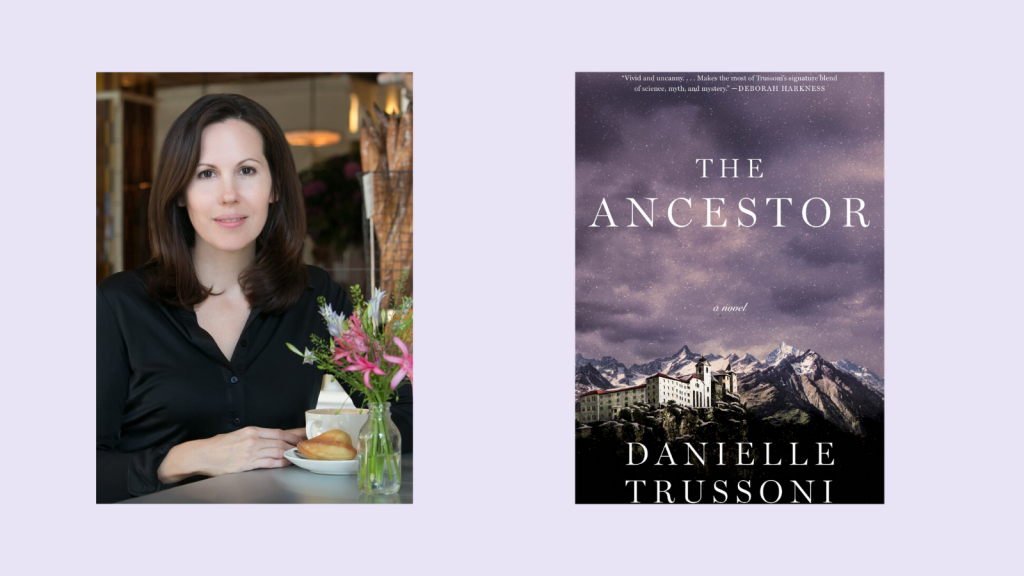Danielle Trussoni is a New York Times bestselling author of the Angelology series, as well as of two acclaimed memoirs, Falling Through the Earth, about her relationship with her Vietnam War veteran father, and The Fortress, about her first marriage and time in Bulgaria. Her most recent book, The Ancestor, is both a delightful, gripping gothic horror read, as well as a thoughtful and provocative examination of women, families, evolution, power, genetics, inheritance. Danielle also writes screenplay adaptations and runs a Writer’s Podcast. She has taught at the Hudson Valley Writers Workshop and is a member of the Salve Regina MFA Program faculty in Newport.
I spoke with her before the release of The Ancestor, which received a glowing review in the New York Times, which called it “chilling and inventive.”
Chaya Bhuvaneswar (CB): I’ve noticed that your new novel The Ancestor, which I thoroughly enjoyed and would take on any train or plane ride along with a blanket and a cup of hot chocolate, is receiving praise as a “gothic” and “horror” novel, including in Publishers Weekly and on many “horror novel” lists. In thinking about how other literary fiction writers have played with and refashioned “genre” (I’m thinking of Victor LaValle and Justin Cronin, for example), I wonder: what does ‘genre’ mean for you and has it been a useful way to categorize your work?
Danielle Trussoni (DT): I can say that I have never written a genre book in my life and that I would not categorize my work here as pop fiction/commercial fiction either. My first book, Falling Through the Earth, a memoir that has been called literary and was chosen by The New York Times Book Review as one of their Best Ten Books of the year, is an important story that is also a portrait of real people. Call it literary memoir if you like, but for me, it is the story I needed to tell in the form that could hold such a story. Angelology, my first novel, was written with the same attention to language as my first book but was put into a genre category— supernatural thriller. Because it was a bestseller, it was called commercial. Since then, I have written another literary memoir and another novel that involves elements of suspense and mystery.
So, to answer your question, my training at Iowa was in the training of writing great fiction, which applies to everything I do. I am always striving to push the limits of categories, and if people have a hard time classifying me, I see that as a very good thing! As far as I’m concerned: good writing is good writing, wherever you shelve it.
CB: About the book itself— there are interesting feminist and woman as monster themes, My Favorite Monster, the graphic novel being another favorite example— and I wondered if you had intentionally set out to explore these as well as reference the history of gothic and horror novels by women.
DT: The Ancestor is firmly in the tradition of Mary Shelley and the Brontes (and contemporary writers like Sarah Perry or Jess Kidd), all of whom use the gothic elements of the supernatural or historical hauntings to create stories. I think of Frankenstein as the ultimate feminist novel, the horror of what happens when a man removes a woman from the creation of human life. I see this as a metaphor about the world we live in, in which women are kept from power, sidelined from authority, and marginalized in a thousand small ways. It creates a monstrous society.
CB: I’ve listened to and been thrilled by your writing advice for literary fiction and nonfiction writers on the podcast you run that readers and emerging writers can access here: writerlypodcast.com. Do you have advice you might condense here for writers who, reading The Ancestor, get inspired?
DT: My advice to all writers is to spend the time you need learning to write a great story. Read widely and write every day. Don’t limit yourself to a certain kind of writing, and write what inspires you. Understand craft, and think deeply about what it means to be a storyteller. One of my favorite endeavors as a writer is exploring new ways to tell a story. Experimenting with different traditions of storytelling is deeply rewarding, and I find that readers respond to innovative and fresh takes on literary forms that have moved them in the past.
The technology we have at our disposal now allows us to experiment even further with new forms. For example, in editing The Ancestor with my editor at Morrow, I lost about 100 pages of material, much of it pertaining to the scientific research. I loved that part of the story and felt that it would be a great story in its own right. And so I wrote a 10-part audio drama podcast, partnered with a great director, cast actors, and hired a sound designer. The result is an incredible audio experience of narrative, Crypto-Z, which you can sample here:
https://www.danielletrussoni.com/crypto-z/
CB: What’s next for you?
DT: I have been working on a new series and on adapting my work as a television series. I’m also going to be publishing another piece of the Angelology series, as I have readers who are waiting for more. I have a weekly newsletter that gives writing advice and personal stories from my life to inspire writers and readers, so if you’d like to know more about what I’m doing, please join it by sending me a note at danielle@danielletrussoni.com




